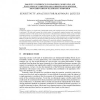Free Online Productivity Tools
i2Speak
i2Symbol
i2OCR
iTex2Img
iWeb2Print
iWeb2Shot
i2Type
iPdf2Split
iPdf2Merge
i2Bopomofo
i2Arabic
i2Style
i2Image
i2PDF
iLatex2Rtf
Sci2ools
117
click to vote
MMB
2004
Springer
2004
Springer
Sensitivity Analysis for MAP/MAP/1 Queues
A sensitivity analysis of a single-server, infinite-buffer queue with correlated arrivals and correlated service times is performed. We study and compare the isolated impact of (normalized) marginal moments and (normalized) correlation structures of the arrival and service processes on the performance measures of such a queue. For these correlated processes, we use Markovian arrival processes of order 2 (with a hyperexponential marginal distribution), which may be constructed from any permissible set of the first three moments and a correlation parameter. With this closed-form solution for the inverse problem at hand and an appropriate scaling, we take a first step to a consistent and general, completely analytic framework for sensitivity analysis of queueing systems. The presented numerical results focus on the queue behavior in terms of the first two moments of the queue length distribution (computed by means of matrix-analytic techniques). Besides some well-known qualitative te...
Markovian Arrival | Markovian Arrival Processes | MMB 2004 | Sensitivity Analysis | Virtual Reality |
Related Content
| Added | 02 Jul 2010 |
| Updated | 02 Jul 2010 |
| Type | Conference |
| Year | 2004 |
| Where | MMB |
| Authors | Armin Heindl |
Comments (0)

